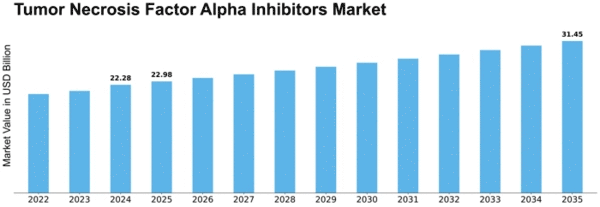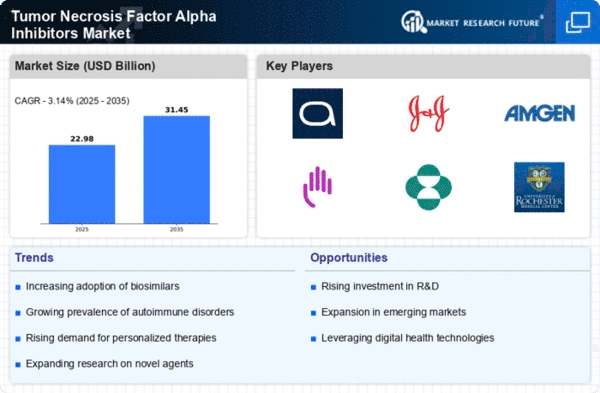Tumor Necrosis Factor Alpha Inhibitors Size
Tumor Necrosis Factor Alpha Inhibitors Market Growth Projections and Opportunities
Tumor Necrosis Factor Alpha inhibitors market valuation is expected to hit USD 47.95 billion in 2032, growing at a CAGR of 7.8% throughout the forecast period. Tumor Necrosis Factor Alpha (TNF-α) Inhibitors Market is in the complex interplay of factors which jointly determine the pace of its development and a direction of its movement. TNF-α inhibitors, the drugs that are mostly prescribed in the treatment of inflammatory disorders, including rheumatoid arthritis and inflammatory bowel diseases, are the drug class which take the central place in the pharmaceutical industry and influence the market as a whole. In this market one of the most substantial driving forces is the raising frequency of inflammatory diseases across the world. With growing numbers of autoimmune diseases and chronic inflammatory disorders, TNF-α inhibitors are becoming more in demand and a large amount of patients are looking for such therapeutic solutions.
The R&D (Research and Development) activities are a crucial component in determining the dynamics of the TNF-α (Tumor Necrosis Factor-α) Inhibitors Market. Significant amount of money is invested by pharmaceutical companies in research and development for TNF-α inhibitors so as to meet the ever-growing needs of patients. Continuation of clinical trials, new drug formulations development and trying to improve safety and efficacy profiles of these inhibitors, work in favor of growing the range of the treatment options, and as a result, stimulating market dynamics. The quest for more effective therapies that lead to less side effects is undoubtedly the main catalyst stimulating the advancement of the sector.
The state of the market regarding TNF-α inhibitors is also being influenced by technological innovations. Developments in drug delivery systems like subcutaneous injections and generic substitutes better afford these remedies to a wider range of patients. These technological innovations are not only a helping hand for patients who are compliant but are also a contributing factor to the overall growth of the market with the use of advanced tools for tailor-made treatment plans and monitoring.
Regulatory issues and approval cycles are of a high relevance when it comes to the dynamics of TNF-α inhibitors. Stringent regulatory rules are applicable to the approval of new drugs thus they are confirmed to be reliable and effective. Regulatory approvals do not only validate the credibility of TNF-α inhibitors but they also present the path to increased market penetration. Pharmaceutical companies dealing with these regulatory frameworks in a very classic way by discovering new and more effective TNF-α inhibitors and thereby changing the overall industrial dynamics.
Another significant factor that sets dynamic in the market is competition among pharma companies and other healthcare stakeholders. Companies employ several mechanisms such as mergers, acquisitions and partnerships to enhance their competitive edge and add more TNF-α inhibitors to the market.




















Leave a Comment